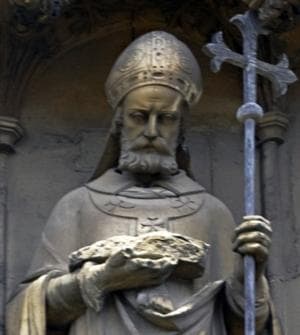
Blessed Lanfranc Of Canterbury
Blessed
Feast Day: May 28
Death: May 24, 1089
Biography
Blessed Lanfranc of Canterbury, also known simply as Lanfranc, was born around the year 1005 in Pavia, Italy. He received an excellent education in England before traveling to Normandy, where he joined the renowned monastery at Bec.
At Bec, Lanfranc became known for his exceptional intellect and teaching ability, establishing a highly esteemed school that attracted students from all over Europe. He gained a reputation as a great scholar and theologian, earning the respect and admiration of his contemporaries.
Lanfranc's theological acumen led him to engage in important debates of his time. He fiercely opposed the teachings of Berengarius, who denied the real presence of Christ in the Eucharist. Lanfranc's efforts to defend Catholic doctrine proved successful when the Lateran Council of 1059 defined and upheld the Catholic position.
Not only a scholar, Lanfranc was also a trusted advisor and diplomat. He played a critical role in obtaining the necessary papal dispensation for the marriage between William, Duke of Normandy, and Matilda of Flanders. This union would later result in William's historic invasion and conquest of England in 1066.
In recognition of his valuable contributions and unwavering commitment to the Church, Lanfranc was appointed as the Archbishop of Canterbury following the Norman Conquest. As Archbishop, he worked diligently to secure the primacy of the See of Canterbury over that of York, resolving disputes and asserting the authority of his office.
Lanfranc also played a significant role in reformation efforts within the Church in Scotland. His leadership and guidance were instrumental in preventing numerous ruptures between the Pope and the English monarchy over matters concerning tithes and the distribution of wealth.
During the investiture controversy, Lanfranc consistently upheld the rights of the Church, opposing attempts by secular authorities to control ecclesiastical appointments. He defended the autonomy of the Church and the sanctity of its sacraments, firmly asserting the Church's authority in spiritual matters.
Lanfranc's wisdom and influence were not limited to political and administrative affairs alone. It is believed that he advised William the Conqueror to designate his eldest son, William Rufus, as his successor. Throughout William Rufus' reign, Lanfranc diligently sought to maintain moral order and rectify any wrongdoing committed by the king.
Blessed Lanfranc of Canterbury passed away on May 24, 1089, in Canterbury, England, from natural causes. He was laid to rest beneath the Saint Martin altar at Canterbury Cathedral, a place where his memory continues to be honored.
Although not formally canonized, Blessed Lanfranc is recognized for his remarkable intellect, his dedication to the Church, and his tireless efforts to defend and uphold Catholic doctrine. His unwavering commitment to the Church's autonomy and his steadfast moral guidance have left a lasting legacy. As we commemorate his feast day on May 28, we honor a man whose wisdom and influence continue to inspire faithful Christians to this day.